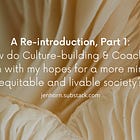A Re-introduction, Part 2: Making Meaning of Our Past, Present & Future Story
Reflecting on how this new-ish place I’m in makes sense in my personal and professional journey, and embracing it, as one of several ways of being and moving through this world. :)
How might we make sense of where we are now when we’re not sure that our current and potential future life chapters make sense with the life chapters that have passed?
We pause, reflect, connect dots, and make meaning.
Meaning-making, a concept in the field of psychology, is the process of “how people construe, understand, or make sense of life events, relationships, and the self”.1
In a number of coaching conversations I’ve had in the past couple of months, a common theme I would hear is how some of my coachees were going through a period of transition and discomfort, and wanted to pause, take stock, reevaluate where they are, see if they’re still “on track”, and where they might want to pivot or go next.
While our stories may be different, I too have had this feeling of uncertainty, or that maybe something was missing, similar to what I would hear from these coachees. As I said in Part 1 of this Reintroduction, coming from my previous work with Muni (and my Masters, and my brief time as a sustainability lecturer in Ateneo), it felt that the work that I now do at Haraya Coaching was not as linked to work that I had done before.
In his 1946 book Man’s Search for Meaning, psychiatrist and holocaust survivor Viktor Frankl posited that “the primary motivation of a person is to discover meaning in life”. By the end of the 1970s, through the contributions of various psychologists, and educators, the term "meaning-making" was used more and more, particularly when it is suggested that knowledge is “actively created by people as they experience new things and integrate new information with their current knowledge”.
This is a key process in pagbubuo, or whole-making, and it’s essentially a lot of what is involved in my writing here. As I go through the things I read, the classes I take, the events I attend, the experiences I gain, I also go through a process of meaning-making when I intentionally take time to pause, reflect and take stock of what I’m learning from all these things I’ve exposed myself to.
Making sense of my journey so far
With Muni, I used to organize community conversations with environmental advocates, social entrepreneurs, social or development workers, creatives of all kind wanting to infuse sustainability into their work and daily living. And now, at Haraya Coaching, I have more conversations with organizations and teams about how they might work more effectively together or cultivate their desired company culture.
As a for-profit organization also working with a lot of organizations (for-profit and otherwise), Haraya Coaching’s organizational clients won’t always have a purpose that I personally resonate strongly with from the get-go. However, I’ve come to recognize more and more this year, that:
I’ve actually managed to work with a lot of individuals and teams in the past couple of years whose purpose I do resonate with — the women social entrepreneurs from Ashoka South East Asia’s DIWA program, and organizations such as PumaPodcast, Angat Buhay, Philippine Business for Social Progress, and Roots of Health.
While I may be less inspired by the purpose or mission of some clients vs. others at the start of an engagement, Haraya Coaching supports organizations to become more values-led and impact-driven, and to develop more humanity and wholeness into the workplace. More than just giving people the space to feel their feelings, I believe the result of being able to see and share one’s self in the spaces we create for these teams expands one’s capacity to see and serve others. So if I can contribute to the individuals in these organizations becoming kinder and braver at the same time, then that’s the impact we’re creating there.
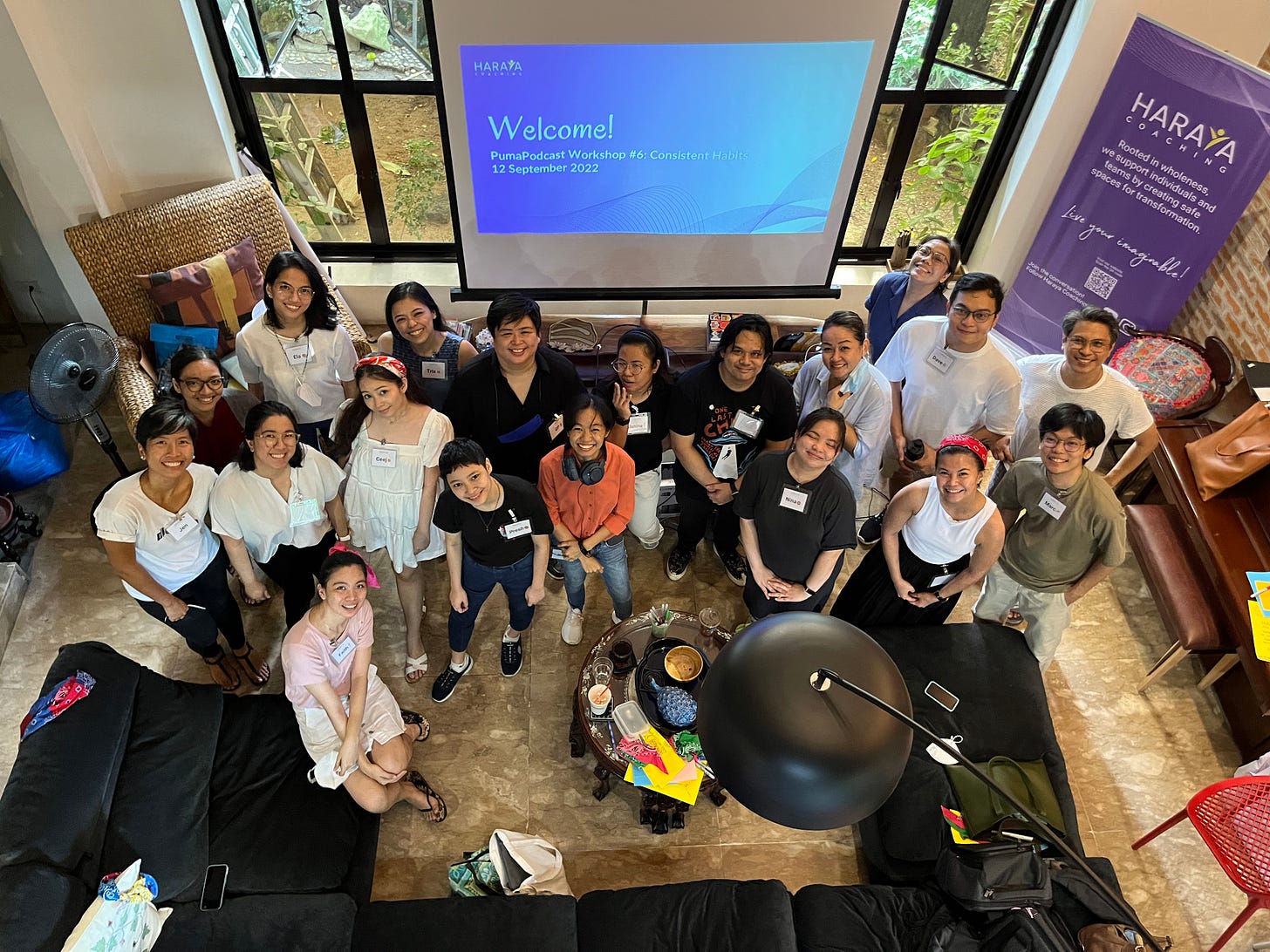
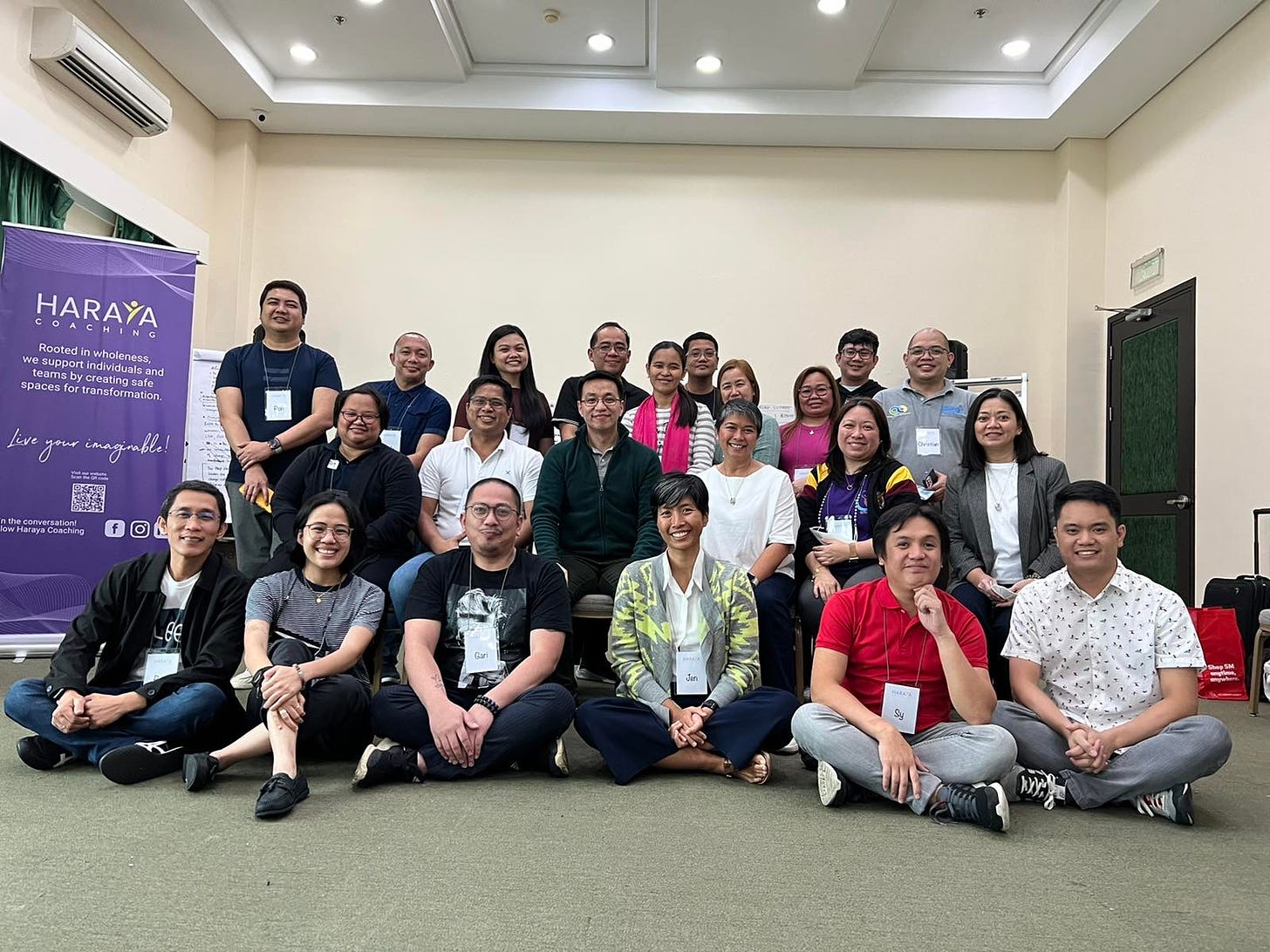
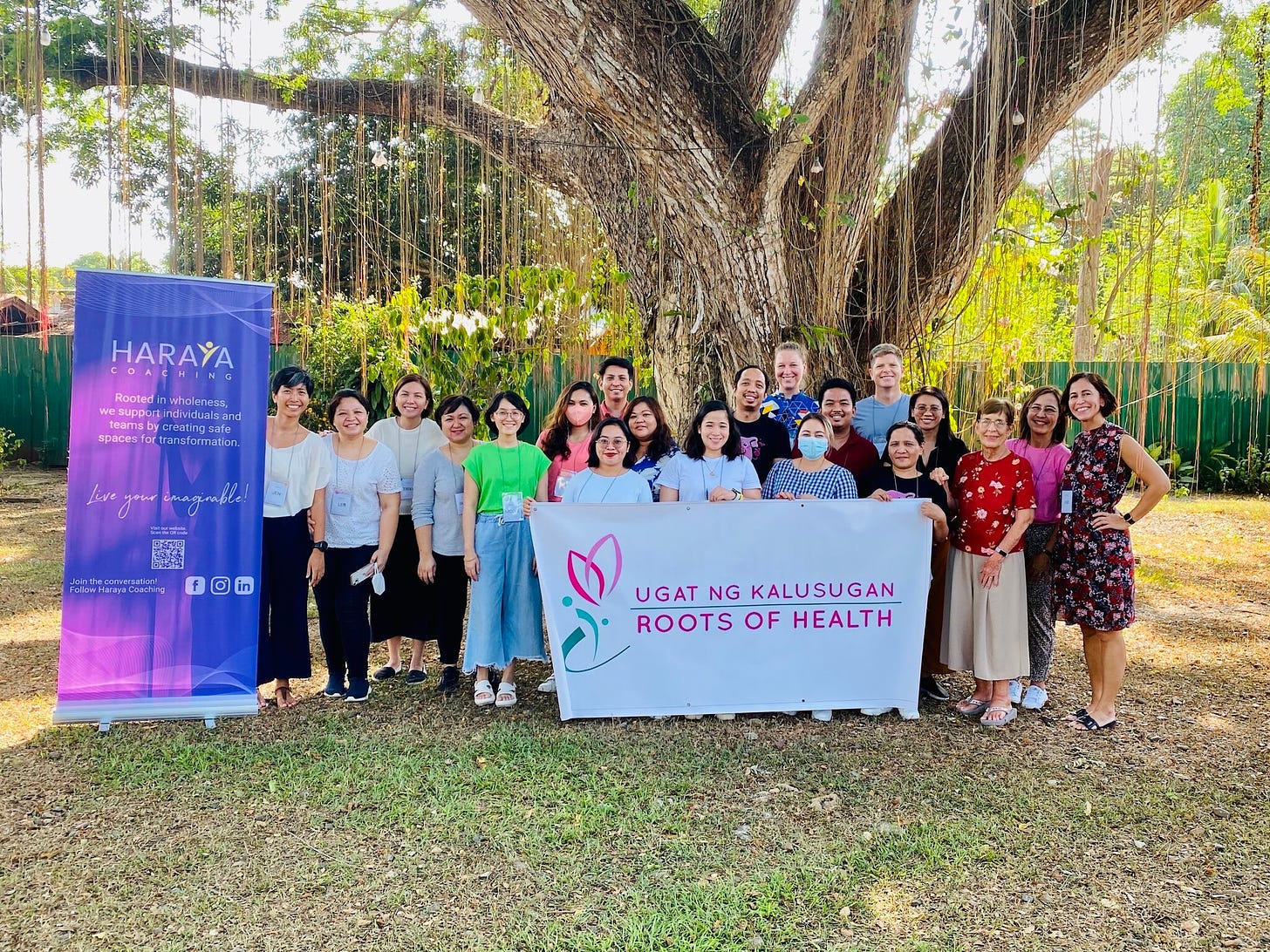
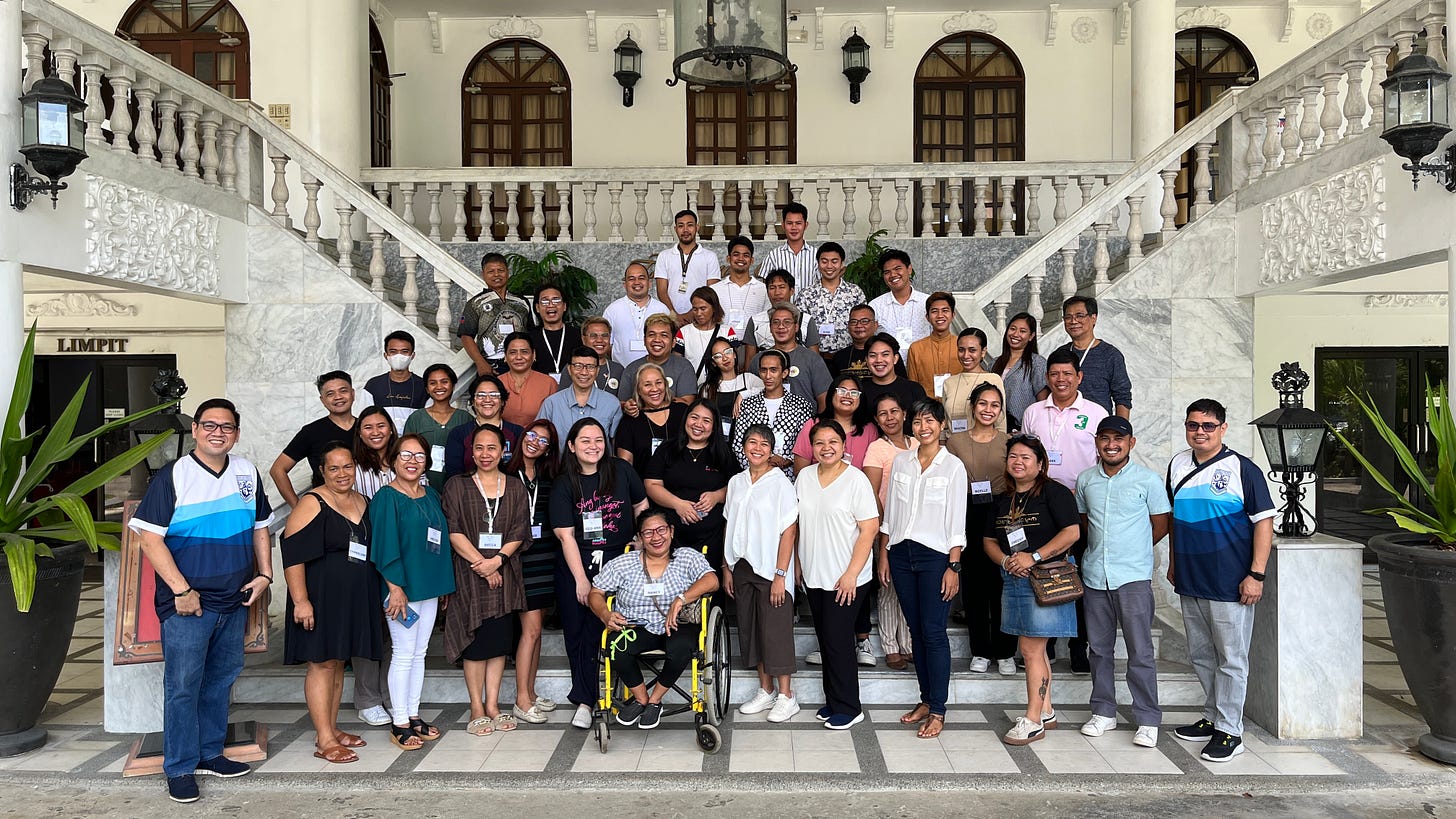
Being able to see and share one’s self expands one’s capacity to see and serve others.
And so while I had been finding a lot of joy and fulfillment in my work with Haraya in the past couple of years, it somehow felt like there was something amiss or “not quite right”. I recognize now that I only needed to embrace my life journey with curiosity and patience, and pausing along the way to check in (and delight in the realization) that I still live my life in line with my values of curiosity, connection, and contribution.
Meaning-making in Coaching and Positive Psychology
Now bringing my reflection back to conversations with two of my individual coachees in particular, I remembered how they seemed to feel lost or ungrounded at the beginning of the call, and then realized that when taking the time and space to reflect, they were “on track” and living their lives in line with their values after all. Just the simple question of how they would describe the “good life” or “meaningful work”, made some of them realize they hadn’t strayed too far away.
Same goes for some of the organizational clients we’ve worked with. When we invite them to reflect on the organization of their journey so far, while they have much more that they aspire to do and be, being able to acknowledge their journey so far, and find meaning and recognize their values lived out in their story, it gives them a greater sense of pride and possibility.
“I’m not that lost pala.”
”Turns out I’m on track after all.”
”We were headed in the right direction pala.”
It would seem that sometimes, all we do need is to assess whether or not we’re living in line with our values — something we say is a measure of the quality of our existence.
Other times, maybe we realized we strayed from our desired path, and yet, the process of meaning-making allows us to find value and learning even from our low points.
In my recent deep dive into Positive Psychology literature and the work of Martin Seligman, he posits that well-being is underpinned by: Positive emotion, Engagement, Relationships, Meaning and Accomplishment (PERMA).2 And that our search for “the good life” is not just a search for a “happy” life in the hedonic sense, but also a meaningful life — one where we belong to and serve something we believe is bigger than our individual self.
I joke about having a seemingly annual existential “crisis”, which I dread and appreciate at the same time. My recurring existential crisis tells me I’m regularly examining my life. Some of those who I’ve done coaching with or facilitate conversations with will say that they’re either going through an existential crisis when they go into the conversation or feeling one coming on as a result of it. I suppose this is part of the human condition. The continuous search for meaning.
And so as I wrap up this post, I invite you to examine your own existence and life journey thus far. You may or may not choose to accept my invitation, though I’d encourage reflecting on a couple of question.
What values steer your course towards living your most authentic life?
Everything you’ve experienced, good and bad, contributes to your pagbubuo. What meaning can you make from your past that helps serve you now and in the future?
Seligman, M. (2011) Flourish: A Visionary New Understanding of Happiness and Well-being. Atria Books. — I read the e-book on Perlego, which is like a Spotify for books, i.e. my treasure trove of e-books I can consume in a non-committal, guilt-free way. I’ve been a subscriber for a couple of years now, and I love it so much! You can get 50% off on your first six months through my referral link.





